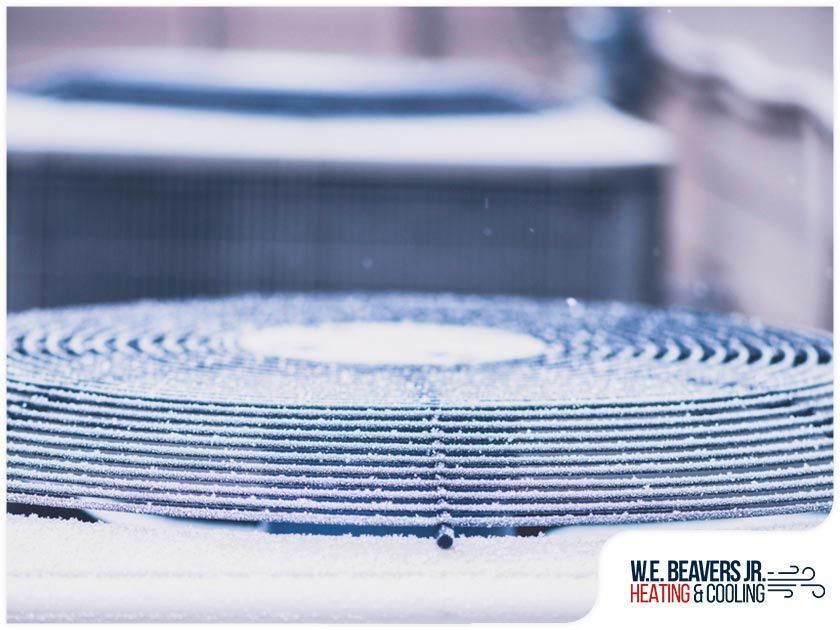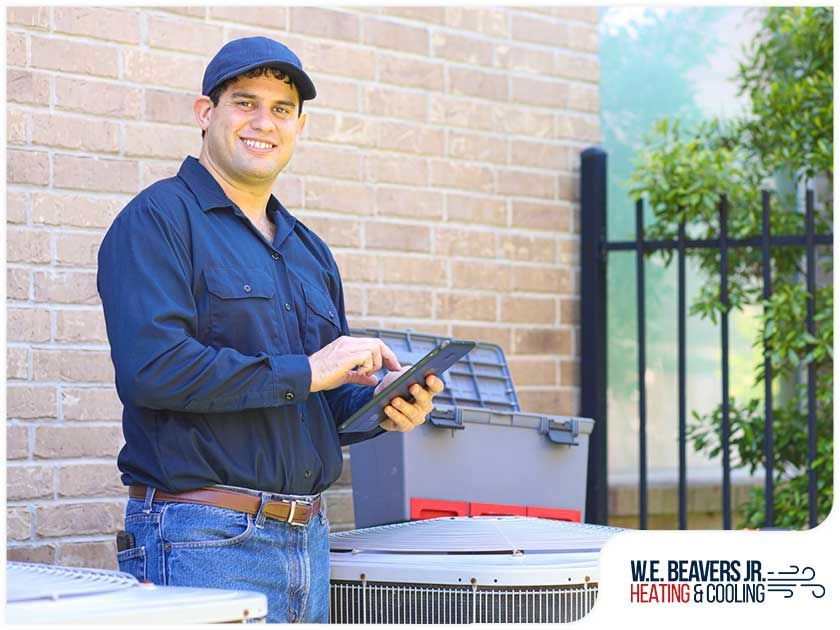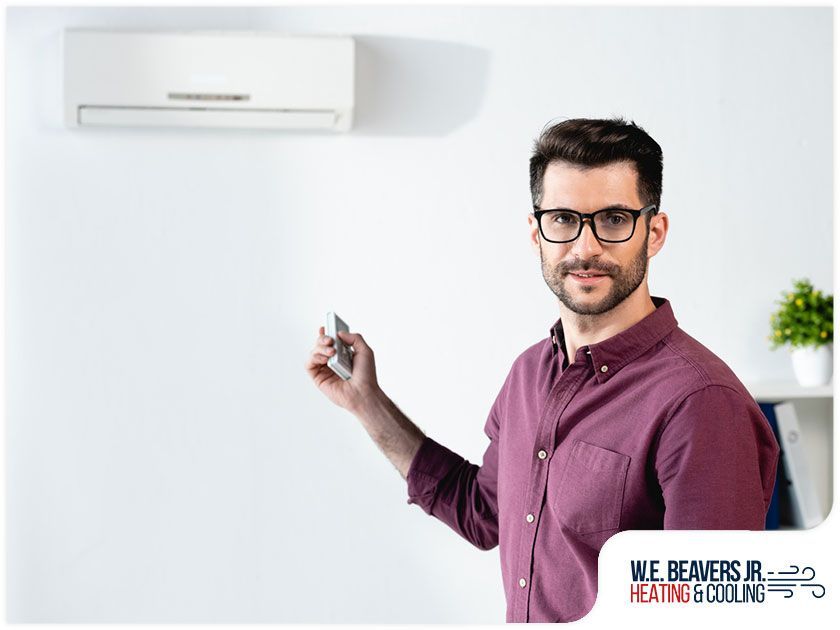How Snow & Ice Can Harm Your HVAC System
How Snow & Ice Can Harm Your HVAC System
Winter conditions can be hard on HVAC equipment, and can damage an external heat pump or compressor if you have central air conditioning. Winter is the most difficult time of year for a house, as practically every element of it is affected by harsh wintry weather. While the roof and external cladding are likely to be the first to be impacted, your HVAC system isn’t immune to winter’s cold, ice and snow.

Here a trusted HVAC repair and installation technician, W.E. Beavers Jr. Heating & Cooling, examines how snow and ice can potentially harm your HVAC system and what you can do about it.
How Winter Conditions Affect Your HVAC Unit
Snow buildup. Your system may fail to operate if your outdoor equipment becomes covered in ice and snow, which can pile up on the aluminum fan and coil fins and bend them. If this occurs, your HVAC unit might produce strange noises while operating, and the fins can potentially shatter. This issue can be avoided by keeping outdoor components clear of snow and ice.
Melting snow and ice. Water can puddle around external equipment as snow and ice melt. When temperatures drop low enough, this water can refreeze, causing damage. Water from melted snow can also enter an outdoor gas furnace’s inner valves and other components, leading to malfunctions and corrosion.
Snow and ice blockage. A heat pump’s outdoor components consist of a compressor and a fan that blows air across a coil. Condensation accumulates on the coil as it removes moisture from the air and can eventually freeze in the winter, restricting airflow and heat transfer.
As the heat pump draws air from all four sides of its exterior unit, it should be kept clear of snow and ice as recommended by cooling services experts. While heat pumps may perform a defrost cycle to remove small amounts of snow and ice, excessive amounts can increase utility costs and shorten the life of your heat pump.
Frozen pipes. Frozen pipes result in obstructions, which will gradually back up toward the source. This, in turn, may result in operational difficulties. This problem can be avoided by insulating the pipes located in the colder areas of your home, such as the attic, basement and garage.
Corrosion and rust buildup. Melting snow can lead to water entering your system, freezing, then expanding again. This will result in corrosion and rust buildup throughout your HVAC unit.
Protecting Your HVAC System
Ultimately, winter weather gives HVAC units a double whammy: it frequently restricts airflow, which can result in your device shorting or burning out sooner than intended. Here are the top eight tips for avoiding potential damage to your HVAC system due to cold weather.
Proper installation of a heat pump. If your home’s exterior unit is used throughout the winter, you probably have a heat pump. Upon installation, assure that the heating and cooling services experts installing it place the outdoor unit well above the usual snowfall level (6-10 inches) rather than directly on the ground. This is typically accomplished using plastic legs known in the industry as “pump ups.” Additionally, the unit should be at least 18 inches away from the exterior wall to allow for adequate airflow and reduce exposure to drifts.
Perform a visual inspection of the surrounding area. Tree limbs that may have appeared harmless throughout the warmer months of the year could endanger your outdoor HVAC unit during a snowy winter. Scan the area around the unit to ascertain if there are heavy snow-laden limbs that could break off and cause damage to your HVAC equipment.
Check for leaks in the surrounding gutters. Water that leaks from the gutters onto your HVAC unit, where it then freezes, can obstruct airflow and could cause the entire unit to freeze.
Clear heavy build-up off of your HVAC unit. Along with removing any potentially hazardous tree branches or limbs from around your outdoor HVAC unit, it’s critical to clear off the unit itself. Heavy snow or ice accumulation can cause ventilation problems, condensing unit or heat pump failure and other issues that can result in a costly repair.
Make sure that any substantial snow or ice accumulation on your HVAC unit is carefully removed. A heating services expert recommends avoiding removing ice or snow with an icepick or other sharp tools, as this may cause additional damage to the system. Instead, use a stiff brush to clear off thick snow or ice. Warm water can also be used to assist with ice that’s difficult to remove.
While you’re clearing snow from around your unit, you should also shovel it away from the sides and out from underneath.
Change out the air filter. It’s now more critical than ever to replace your air filter at least every three months. Your HVAC unit is working overtime to distribute heat throughout your house, and having a clean filter means that your furnace will have less work to do and that airflow will be boosted.
Consider a protective system. If you want to avoid having to clear snow from around your heat pump, it’s a good idea to utilize a protective system. Protective systems divert snow away from your outdoor unit, offering additional protection from ice and snow.
Additionally, a protective system can assist in safeguarding your outdoor heating unit from icicles that may collect on the gutters or roofing above it. These icicles can cause significant damage to your HVAC system if they fall on it. You can purchase a protective system for your outdoor heating unit or design one yourself.
Cover your A/C unit. If your outdoor system isn’t operational during the winter, this means you have a standard air conditioner. According to a heating and cooling services expert, covering the unit will help safeguard it as long as you leave enough space around it for air to circulate. Consider constructing a roof or freestanding structure over it to protect it from the elements. You can also create a wind barrier with plants or fencing–just make certain to leave adequate space for servicing the unit.
Check your exterior vents. Snow accumulation that obstructs your external heating vents can be hazardous and costly to your HVAC system. Whenever there’s significant snowfall, take the time to inspect and clean up around your external vents.
It’s essential to incorporate regular checks of your external vents into your snow removal strategy. When you’re out plowing, shoveling or snow- blowing your driveway and pathways, don’t forget to check your vents as well.
Schedule regular maintenance. Scheduling routine maintenance is a critical component of ensuring that your HVAC system is prepared to keep your house safe and warm throughout the winter. Along with ensuring that your system is operating at peak efficiency, an HVAC expert can assist in establishing best practices for protecting your outdoor unit during a maintenance inspection.
Prepare your HVAC system for winter. If your heating system is in good shape, it will have fewer problems in the winter. Begin by scheduling an HVAC inspection and tune-up prior to the onset of winter. Clean the area immediately surrounding your outdoor equipment and trim back any nearby plants to ensure adequate airflow. An insulated covering will help prevent blockages in the pipes.
At W.E. Beavers Jr. Heating & Cooling, we’ll help ensure that your HVAC system is winter-ready. We’re one of the area’s most reputable HVAC repair and installation firms, providing a comprehensive range of heating and cooling services. Call us at (703) 897-5505 or fill out our convenient online form to schedule an appointment.



